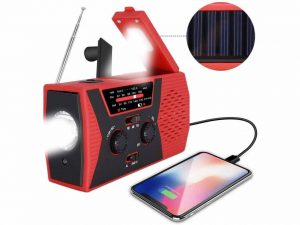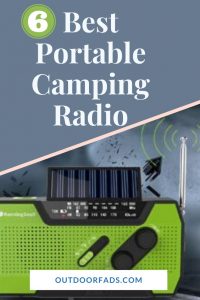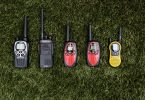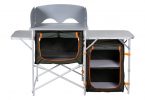We may receive commissions when you buy through the links on our site. Full Disclaimer.
Camping can be fun and exciting if you go well-prepared. Your camping bucket list is going to contain a lot of items and, a camping radio should be one of them. Purchasing the best portable radio for camping is a brilliant idea as it will help you keep up with what is happening in your city and also provide entertainment.
You will need to look at so many things as an ideal radio for camping is different from the ones you use at home.
This article will be looking at the best outdoor radios for camping to enable you to make a good purchase. Listed below are some of the best outdoor radio products available in the market and their reviews;
1. RunningSnail Solar Crank NOAA Weather Radio
The first product here is a multi-powered AM/FM outdoor radio. It can be powered by hand cranking or solar energy. It features a rechargeable battery with a 2000mAh battery capacity. This battery can last for up to 5 hours when listening to the radio.
This radio features NOAA weather alert system so it can keep you alerted on several weather conditions such as storms, tornadoes, and hurricanes. In cases of emergency, you can send warnings using the SOS alarm system.
A USB port is available from which you can charge your phones and other devices. The product weight is just 10.2 ounces.
- Lightweight
- Multi-powered
- AM/FM receiver
- NOAA alert
- SOS alarm
- USB port
- Batteries not included
2. PPLEE NOAA Emergency Weather Alert Radio
This PPLEE radio is a 5-way powered one. It can be powered by solar energy, hand crank, rechargeable batteries, USB input, and AAA batteries. A pound is the weight of this radio.
It is a weatherproof camping radio made with sturdy materials, and it receives AM, FM, and shortwave signals. About 7 NOAA weather scans are pre-loaded on this radio. An adjustable antenna is featured to receive more quality radio signals.
The radio does feature an SOS alarm system, LED flashlight, and reading lamp. You can use it to charge your mobile devices using the in-built USB charging port.
- Lightweight
- 5-way powered
- Durable
- AM/FM, Shortwave receiver
- NOAA alert
- Adjustable antenna
- SOS alert
- LED flashlight
- USB charging port
- Noisy AM
3. DreamSky AM FM Portable Radio
The DreamSky AM FM Portable Radio defines portability as its compact enough to fit into your pocket. It is one of the best AM-FM radios for camping.
This radio has a speaker that produces moderate sounds. A 3.5mm headphone jack is featured for your private listening.
It features a metal telescopic antenna capable of capturing quality signals with less difficulty. The antenna reached a full length of 14 inches.
The radio is powered by batteries and comes with 2 AA batteries. Using it is easy, and it weighs just 8.5 ounces.
- Ultra-compact
- AM/FM receiver
- Lightweight
- Headphone jack
- Lengthy antenna
- Easy to use
- Speaker not very loud
4. RegeMoudal Emergency Solar Hand Crank Radio

RegeMoudal Emergency Solar Hand Crank Radio
This is an AM, FM, and WB radio receiver manufactured by the RegeMoudal brand. With this radio, you can stay updated on weather conditions as it features the NOAA weather alert system. It also comes with an SOS alarm system.
It features a 2000mAH rechargeable battery, which can last for 4 to 6 hours for radio time. The battery can efficiently charge your mobile phones and like devices.
You can as well power this radio using solar energy, AAA batteries, or a USB cable. At night, you can make good use of the 1W flashlight, and 6 LED reading lights for illumination.
- Lightweight
- AM/FM/WB receiver
- NOAA alert
- SOS alarm
- Power bank battery
- Multi powered
- Flashlights
- Size might be too small
- Sound not very loud
5. Kaito 5-Way AM/FM/SW Radio
This Kaito radio is powered mainly by a solar panel with inbuilt rechargeable batteries. You can also power it with AAA batteries, mini USB, hand crank, or with an AC/DC charger.
You can revive AM/FM and shortwave signals with this radio. It will also come in handy for emergencies thanks to its NOAA weather and SOS alert system.
The Kaito KA500RED outdoor radio is a lightweight piece; it weighs 1.5 pounds. There is a USB port from which you can charge your devices. A flashlight is featured too.
- Multi-powered
- Lightweight
- AM/FM and shortwave receiver
- NOAA weather
- SOS alert system
- USB for charging
- Flashlight
- AC/DC charger not included
6. ZesGood Portable Transistor Radio
You would prefer this radio if you need quality sounds as it features an HD speaker. Also, it has a 3.5mm earphone jack that you can plug in your earphones.
This radio receives AM and FM signals and comes with an extendable antenna of about 14 inches. It can capture and maintain stable signals. Tuning and switching channels are swift, which makes this radio simple to use.
You need 2 AA batteries to power this ZesGood radio. The weight is light at 5.6 ounces.
- HD speaker
- Lightweight
- Earphone jack
- AM/FM receiver
- Volume is on/off button
- Bottom not very stable
- Batteries not included
Read: Best Walkie Talkies for Camping
Best Portable Radio for Camping – Buying Guide
There are certain things to look into and specific factors to consider to purchase the right unit. This and more are what will be discussed in this buying guide.
Types of camping radios
There are different types of camping radios based on how they are powered. They include;
Battery-powered camping radio
From the above list, you would agree that battery-powered camping radios are the most common camping radio type out there. Simply, they are radios that are powered by batteries. However, the battery type may differ as some are rechargeable while some are not.
Solar-powered camping radio
Solar-powered camping radios get power from the sun (solar energy). Such camping radios feature solar cells/panels that are capable of transforming the sun’s solar energy to electrical energy. The converted electrical energy is what powers the radio. As a result, the performance of the radio majorly depends on how much sunshine is available. Solar-powered camping radios are usually not ideal for the winter season.
Hand-cranked camping radio
These types of camping radios can be referred to as a traditional one. They are manually started by pulling it spinning a mechanical crank. Though still available, such units are not very common nowadays.
Other Factors to consider when purchasing the best portable radio for camping
Below are some factors to consider when purchasing a portable camping radio;
Portability
Since you are looking to buy the radio for camping purposes, portability should be the first factor to look out for. A camping radio is portable if it is light in weight and compact in size. If not, it would be inconveniencing to carry it along, whether in your hand or a backpack.
Most durable outdoor radios usually have a bit of weight, which is fine. Besides, an ultra-light camping radio won’t be very sturdy. Simply ensure that the weight is not too much.
Power Source
As discussed earlier, camping radios are powered differently. Some are powered by batteries, others solar, and some are started mechanically. Whereas battery-powered radios are more ideal, you should go for what meets your interest.
Radios that run on non-rechargeable batteries can be useful in any situation as long as the batteries can be replaced when they run out of power. If you’re capable of generating or sourcing electricity while camping, a rechargeable radio would be best. Likewise, if you’re camping in a hot summer period, a solar-powered radio would come in handy.
Whichever you go for, ensure that it has a lasting battery. That way, you won’t always be running out of power.
Durability
When discussing the durability of camping radios, much emphasis is on the weatherproofing. While camping in the great outdoors, you will experience various weather situations, including rain, wind, snow, etc. Your radio needs to be durable and weatherproof to be able to withstand them.
The material with which the radio is made tells how durable it is. A sturdy and high-quality material will also prevent the radio from breaking easily if it falls accidentally.
Audio Quality
A camping radio with excellent sound quality is essential if you want to listen to your favorite radio stations conveniently. Only radio with good in-built speakers can be able to deliver such otherwise, your camping radio will leave you in the lurch.
When looking at the audio quality, you should pay attention to the radio volume. Often, a volume range of 80 to 84 dB is recommended.
Reception Quality
How does the camping radio pick up signals? This is what is meant when referring to reception quality. An ideal radio for camping should not stress you to pick up signals. You do not have to walk around, raise the radio up or down to get quality signals.
This can also be referred to as range so, and you should consider radios with very high ranges. You need very high ranges because it is more difficult for radios to pick out signals in the woods or wilderness where you camp.
Both AM and FM ranges should be checked if you are going to be receiving both signals. Most radios do come with antennas that help in receiving these signals. Sometimes, you might need to purchase and use external antennas as well.
Alert System
Some camping radios feature an alert system that can be used to send and receive broadcasts on weather and other warnings. These radios either carry a Public Alert or an NOAA logo. They can be very helpful in emergency cases.
Secondary Features
Below are some extra features you might love your camping radio to have. They are secondary because any radio without them can still serve you very well outdoors.
- Display
A display screen will let you view the FM/AM channel frequency you are on volume, and some even display time. If this is a feature you would love, there are few camping radios out there that come with a display.
- Flashlight
A radio with a flashlight might come in handy in the nighttime. Of course, you must go with flashlights to camps, but it won’t be a bad idea for your radio to have one too.
- Mobile Compatibility
It will be fun if your camping radio is capable of connecting with your mobile phone. Sometimes, you might just want to listen to music rather than radio channels. This can be achieved if the radio features a microSD card slot or can be connected to Bluetooth. This way, you can stream and enjoy the music you have in your mobile storage.
Best Portable Radio for Camping – FAQs
Q: What is the difference between UHF and VHF?
A: UHF stands for Ultrahigh Frequency and is ideal for receiving signals in areas with obstructions. These obstructions can be different structures but, most notably, building.
VHF stands for Very High Frequency and is ideal for receiving signals in areas without obstructions. Places like fields, beach sides, etc.
Both frequencies are essential when purchasing a camping radio. The ideal one for you will be based on your camping destination.
Q: Can I buy earpieces, headsets, and carry cases to fit my radio?
A: Some outdoor radios feature ports for headsets and earpieces. If yours does, then you can. A case is important to protect your radio so you should carry one along though some radios come with cases.
Q: Can I charge my mobile phone with my camping radio?
A: Most mobile phones are charged using USB cables so you can charge your mobile phone if your radio features a USB slot. Note that this may drain your radio battery.
Maintenance Tips for Outdoor Radios
Maintaining your outdoor radio is an important aspect of owning it. Here are some maintenance tips you can utilize;
- Clean occasionally
Dust and dirt will always find a way to settle on your radio. As a result, you should frequently clean your camping radio. If possible, clean them every day before use.
- Utilize the user manual
Most people often overlook the user manual included when a product is purchased. This is wrong. Your radio user manual should be put to use judiciously. Manufacturers often include safe methods of using their electronics in product manuals. It is crucial to read the manual before using the radio.
- Change the batteries when due
Old batteries in your radio can damage it. These batteries do leak and can spoil the radio battery terminals. To avoid such, regularly inspect your radio batteries and change them when due.
- Ensure proper ventilation
Most radios feature mini vents from which air passes through to reach the internal components. These components get heated overuse, which is why keeping these air vents clear is vital to cool them off and prevent overheating. Ensure that the vents are not clogged by dirt or likes and do not cover them yourself.
- Store properly
You should properly store your radio to avoid damages. Ideally, you should keep it in a safe case or bag when not in use. This is also applicable when the radio is in use. Place it in a safe spot where it won’t fall or be hit and become damaged. Very importantly, do not expose your outdoor radio to water or moisture.
Troubleshooting AM/FM reception of camping radios
Sometimes, the best AMFM radio for camping can still give you reception problems. Various factors can cause this. If you encounter issues with reviving AM/FM, try the following to troubleshoot;
- Change stations
The reception problem might be peculiar to just a station. AM/FM stations with low-powered transmitters usually have this problem. Sometimes it could be that the station is located at a very far distance from your camp destination.
- Reconnect the antenna
An improperly connected radio antenna will have difficulties picking up any signal. Check the antenna connection to ensure it is well connected. You can also try adjusting/readjusting the poles.
- Reset the radio
If you have been using your radio and it stops receiving AM/FM signals all of a sudden, the cause could be a recent change effected. To fix this, try resetting your radio. Procedures for this should be included in the user manual.
Final Thoughts
You will find it easier to purchase the best outdoor radio for camping with the information contained in this article. The best products listed can serve you very well, and you can make the best choice with the help of the detailed buying guide.
Most importantly, do not forget to follow the maintenance tips to ensure that the radio lasts for you. Proper maintenance is key to durability.










